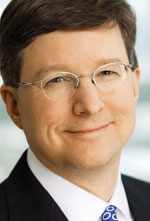
After more than 40 years of operation, DTVE is closing its doors and our website will no longer be updated daily. Thank you for all of your support.
Consumers moving to on-demand but bundling still makes sense, says Discovery
Polish and other central and eastern European customers are increasingly looking to non-linear and advanced TV services, but bundled pay TV remains key to the success of content providers and guarantees continued investment in high value content, according to Mark Hollinger, president and CEO of Discovery Networks International.
Speaking at the Digital TV CEE conference yesterday, Hollinger said that VOD is beneficial provided it is additive rather than a replacement for linear TV.
According to figures cited by Hollinger, linear TV viewing continues to rise but 49% of viewers in Poland are now regulaly consuming live TV online. Thirty-five per cent of viewers in Poland regularly use VOD, he said.
Hollinger said that three quarters of Polish viewers continue to watch scheduled shows, but 85% would prefer to watch TV when they want rather than have the schedule dicate when they should watch. He said that the research showed that 53% of Polish viewers would be interested in a device or services that automatically recorded TV shows they might interested about.
Discovery conducted research amongst 5,000 viewers across 10 CEEMEA markets in partnership with the The Future Foundation.
Hollinger said the investment model in a completely on-demand environment or a completely a la carte environment would be “very different” and that channel providers including Discovery would invest much less in content in this environment. “The investment model for great content will still need some stablity to it,” he said, adding that subscription was an important part of that.
Hollinger said Discovery had rarely done deals with SVOD players, although it had done a deal with Netflix. However, in this case Discovery had insisted on network branding as part of its deal. “We didn’t want to sell programmes in a completely unbranded environemnt but we also didn’t realise how important it was for viewers,”he said.
The pay model still dominates Discovery Networks International’s business and the dual revenue model still provides stablity for investment, despite recent investments in free to air businesses, said Hollinger.
He said that Discovery was, on the other hand, keen on doing TV Everywhere deals with affiliates and now had deals with about a quarter of its distribution partners.
Referring to investment in channels in the CEE region, Hollinger said that Discovery intends to make ID into another global network to join Discovery Channel and TLC.
The female-oriented ID was launched in Poland last year. He said the channel was really starting to take off and that Discovery had used local talent as on-air hosts for shows including Behind the Mansion Walls. “We’ve seen the use of local talent has created great resonance with viewers in Poland,” he said.
Hollinger said Discovery has invested in six local programmes since it launched TLC in the market. It had also filmed episodes of The Magic of Science and Ultimate Cops in Poland for distribution elsewhere.
Hollinger said Discovery had been encouraged to invest in Poland by the government’s open attitude to allowing international broadcasters to compete on a level playing field with competitors. He said this wasn’t the case across the region.
Localisation has been key to Discovery’s strategy, said Hollinger. Most of DNI’s staff are based in-region and are mostly local to those regions. “Having local expertise on the ground is important,” he said.



